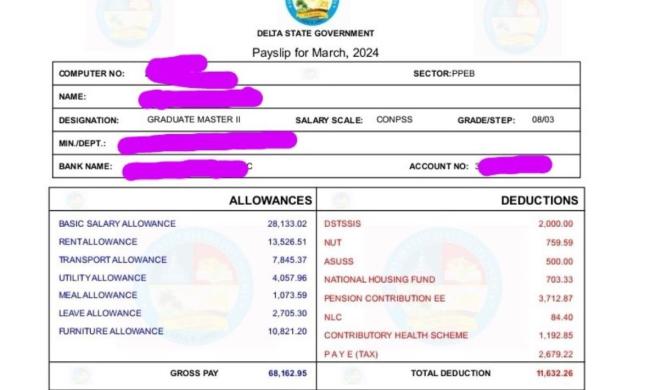
In the Delta State, teachers classified as ‘Graduate Master II’ receive a monthly feeding allowance of just N1,073. This figure was revealed in a March 2024 pay slip obtained by SaharaReporters. Alongside the feeding allowance, the government provides N7,845 for transportation and N4,057 for utilities, bringing the total monthly benefits to N13,075.
The pay slip confirms that the monthly allocation includes N7,845 for transport and N4,057 for utility expenses. Given these allowances, teachers are expected to subsist on N1,073 for food over 30 days, an amount that is less than $1.
This inadequate support highlights the broader issue driving Nigerian workers to demand an increase in the national minimum wage. Currently, there is a push for fairer compensation in response to the country’s economic challenges.
The Federal Government proposed a new minimum wage of N62,000, which was rejected by organized labor. The governors, however, maintain that they cannot afford to pay more than N60,000. The Nigeria Labour Congress (NLC) has firmly opposed any attempt by governors to unilaterally set the minimum wage, warning that such actions would worsen poverty and insecurity.
Last Friday, the NLC released a statement in response to governors’ remarks about determining worker wages independently. Signed by Benson Upah, Head of Information and Public Affairs, the statement criticized the governors’ approach as dictatorial and contrary to the established principles for setting a national minimum wage in Nigeria. Upah emphasized that the national minimum wage ensures a basic standard of living and protects workers’ welfare.
He warned that allowing governors to set wages arbitrarily would harm both workers and the national economy, calling for adherence to collective agreements and established wage-setting principles.